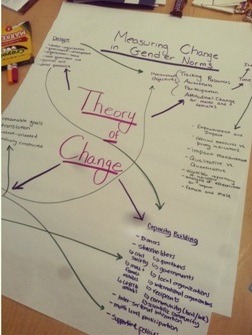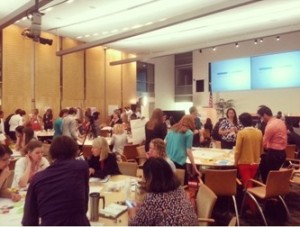Reflections from the Gender 360 Summit: The importance of gender and its critical impact on global health and development
By Kathryn Krueger on June 22, 2014

Highlighting the importance of gender and its critical impact on global development, USAID ASSIST partner FHI 360 hosted the 2014 Gender 360 Summit on June 16th in Washington, DC. This exciting summit brought together close to 300 gender experts, donors from bilateral and corporate companies and foundations, national and international policymakers, research institutions and development organizations around the world. The panel presentations and the collaborative brainstorming and discussion sessions stimulated substantial conversation and interest around the work being done to programmatically integrate and mainstream gender within all sectors. The 2014 Gender Summit highlighted trends, challenges and progress facing gender integration within the development field, while truly showcasing the growing interest and understanding of gender through social and economic lenses.
A running theme at the Gender 360 Summit stressed the importance of understanding that social issues, such as access to health services and poverty, are experienced in vastly different ways depending on an individual’s sex and the social structure of the society in which they live. Gender inequality can mean that women and girls eat last and least when food is scarce, it can mean that only one child is sent to school – generally a male child – when rising school tuitions begin to strain a family’s economic capabilities or it can show itself during a health crisis where a woman dies because she cannot receive necessary treatment without her husband’s consent. The devastating consequences of gender inequality on women and girls are often socially, economically and personally debilitating. At the same time, however, gender is often misunderstood to solely mean ‘women and girls,’ without examining the needs and perspectives of men and boys. A great chance can be lost when men and boys – potential gender equality allies and champions – are not brought to the table and included to change gender norms and address gender disparities that affect everyone.
I was impressed by the range of panelists and speakers who took part in the all-day Summit. Theresa Hwang, Gender Director for CARE USA, emphasized the importance of ‘gender champions:’ those who may not be gender specialists but can be trained as liaisons that work to emphasize the importance of gender-centered politics and practices within all levels of organizations. According to Hwang, it is not enough to stress gender-centered policies, strategies, and practices externally; organizations must also actively work to mainstream and integrate gender into all levels of their organization.
Multiple Summit panelists and attendees noted that, while gender work can be carried out under the direction of just one individual gender focal point, in order to effectively work towards integrating gender into internal organizational structures and external project strategies, the benefits of gender equality must also be backed up with sex-disaggregated data. Keynote Speaker and Senior Coordinator for Gender Equality and Women’s Empowerment at USAID, Susan Markham, spoke about the importance of utilizing sex-disaggregated data when making the case for greater gender integration to continuously monitor the effects that organizational and programmatic gender mainstreaming and integration has on development. This relates directly to quality improvement methodology and the approach of WI-HER to integrate gender through the USAID Applying Science to Strengthen and Improve Systems (ASSIST) Project, using the science of improvement to collect sex-disaggregated and gender-sensitive data and systematically identify and analyze gaps in outcomes among women, men, boys and girls, to find the root causes of poorer outcomes among one group, and design activities to respond to the needs of males or females to close the gap and improve health outcomes for all.
The Gender 360 Summit organized a collaborative world-café style breakout session that allowed Summit participants to interact, share ideas and organize their thoughts through a small group mind-mapping exercise. My group was selected to discuss “measuring change in gender norms,” stimulating a vibrant and passionate discussion between development policy makers, gender specialists, a professor and several interns like myself. Among many topics discussed at my table, the issue of linguistics was a key component to our discussion. The specialized language used in a gender analysis often uses inaccessible jargon that can exclude groups of people from understanding and accessing gender-based work. Aparna Mehrotra, the Senior Advisor on Coordination and Focal Point for Women at UN Women, emphasized the need to address this exclusion by adopting easily accessible language for key concepts and initiatives in order to draw a greater number of people into gender based collaboration. Then, once the discussion is seen as inclusive and accessible, more technical jargon can be utilized.
I am very pleased to say that the Gender 360 Summit was highly successful, thought provoking and promoted community building. Having the unique chance to listen to key change agents talk about the role that gender integration and mainstreaming plays within high-profile and effective human development organizations and companies was truly inspiring. It is clear that more work must be done to integrate gender into all levels of intra-organizational systems and external project structures, but the Gender 360 Summit proves that gender integration and mainstreaming is increasingly becoming recognized and utilized to create positive change and improvement in the health and quality of life among women, men, girls and boys around the world.
